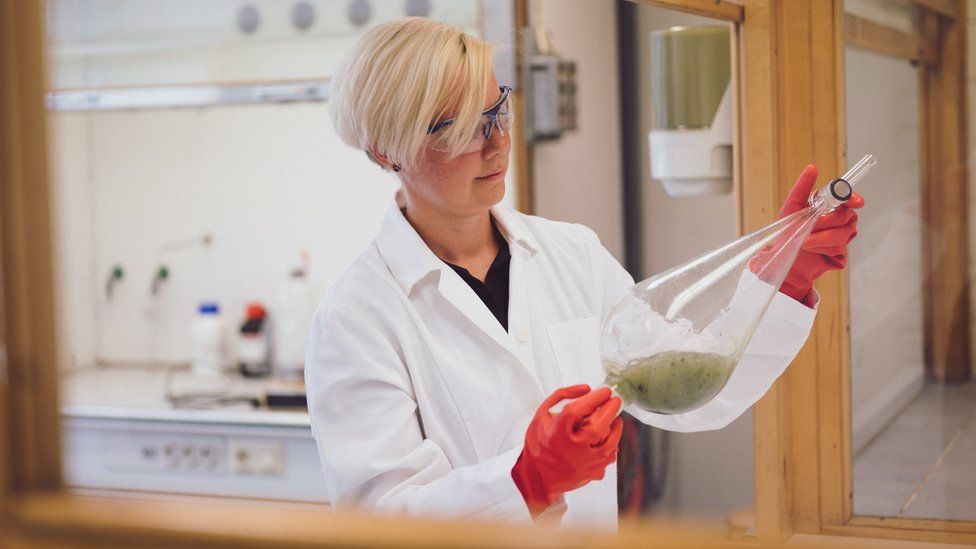ARTICLE AD BOX
 Image source, ObO
Image source, ObO
Mari Granström, a biochemist, sources algae from the Baltic Sea and larger seaweed from the Caribbean
Excessive outbreaks of seaweed are clogging up waters from the Caribbean to the Baltic. Now the algae is being harvested alongside farmed crops to create ingredients for cosmetics and food products.
Mari Granström says it was her passion for scuba diving that opened her eyes to the continuing problem of toxic algae blooms in the Baltic Sea.
The outbreaks occur when tiny cyanobacteria, also called blue-green algae, suddenly multiply rapidly, stretching out on top of the water for potentially kilometres.
Also called eutrophication, it is a form of marine suffocation, and it is a significant environmental concern in the Baltic Sea. It can occur in 97% of the total area of the sea, according to official figures.
The blooms impact on other marine life, by causing oxygen deficiency, reducing water quality, and blocking out light.
Image source, Getty Images
Image caption,Algae blooms can plague the Baltic Sea, particularly in the summer
The problem is caused by too many nutrients entering the water, typically nitrogen and phosphorus from artificial fertilisers. These are carried into the sea by the rivers of the surrounding countries - Denmark, Estonia, Finland, Germany, Latvia, Lithuania, Poland, Russia and Sweden.
While the use of such fertilisers has reduced in recent years, the Baltic Marine Environment Protection Commission, the intergovernmental organisation that aims to improve water quality in the sea, says "the effect of these measures has not yet been detected".
Some six years ago Ms Granström, a Finnish biochemist, determined to tackle the problem herself. She'd harvest the algae and use it to make ingredients for a host of products. In addition to cosmetics and human food, the algae extracts can be used in detergents, animal feed, packaging, and even as a replacement for plastic.
This comes as there is a growing trend for seaweed to be harvested for such purposes, as a replacement to oil-based ingredients.
Image source, ObO
Image caption,Origin by Ocean produces numerous extracts from the algae
"I saw with my own eyes - or perhaps couldn't see - how it was affecting the marine ecosystem, and decided to do something," she says. "There was too much finger pointing and not enough action."
Ms Granström says she worked on the project as "a hobby for a long time", before in 2019 setting up a company called Origin by Ocean (ObO). She is the chief executive.
The business, which has attracted both commercial investment and European Union funds, is now continuing with a pilot production scheme ahead of aiming to be fully operational by 2025-26.
ObO collects the algae off the coast of Finland, where it is sucked on to boats and then separated from the water. The firm is also importing invasive sargassum seaweed from the Dominican Republic in the Caribbean.
Image source, ObO
Image caption,The algae is harvested by sucking it out of the sea
Vast blooms of that algae have plagued that region for a number of years. "There are 25 million tonnes of sargassum blooming in the Caribbean every year," says Ms Granström.
"It stops people fishing and harms tourism. We are now buying several tonnes of sargassum from the Dominican Republic, and this volume will increase."
The company further sources unwanted seaweed from Portuguese and Spanish waters.
ObO's pilot processing is done at a facility in northern Sweden. It uses a patented biorefinery technology it calls "Nauvu" to separate the algae into numerous useable materials.
These are then sold to food, cosmetics, textiles, packing and agricultural companies.
Global Trade
To help grow the business ObO is working with one of its investors, Finnish chemicals and industrial group Kiilto. "If this can be successfully scaled up here, then ObO can replicate similar processes around the globe," says Ville Solja, Kiilto's chief business development officer.
ObO already has plans to set up a refinery in the Dominican Republic.
Across in Sweden, a separate business called Nordic Seafarm is showing just how versatile seaweed can be.
"We make algae-based gin and beer, both locally produced," says director Fredrik Gröndahl.
Nordic Seafarm, which grows its own seaweed, is a commercial spin-off from Seafarm, a Swedish government-funded project that helps commercialise aquaculture research.
"If this market [for seaweed] gets big, and we think it will, we are ready to scale up," adds Prof Gröndahl, who is also project leader of Seafarm, and head of department for sustainable development, environmental science and engineering at the Royal Institute of Technology in Stockholm.
"Just imagine if Ikea asked for algae-based meatballs globally, which could happen."
Image source, Fredrik Gröndahl
Image caption,Prof Fredrik Gröndahl helps to run a company that puts seaweed to various uses
Prof Gröndahl also hopes that in the future algae will become a key ingredient in animal feed, to replace environmentally-damaging fish meal, which is common in pigs and poultry diets. "Algae is also cheaper than existing ingredients as there is no cost for feeding and irrigation."
Back at ObO, Ms Granström says the aim is for shoppers around the world to "play a part in cleaning up the Baltic Sea" by simply buying a number of consumer products.
"We wanted to do something to help at both ends of the process, upstream and downstream, as it were - cleaning the seas, but also monetising a change in consumer behaviour."

 1 year ago
42
1 year ago
42








 English (US) ·
English (US) ·